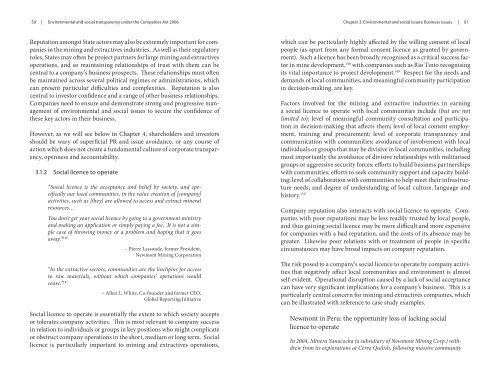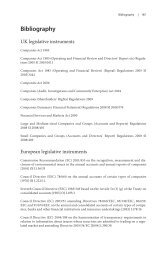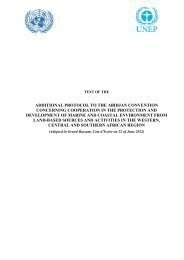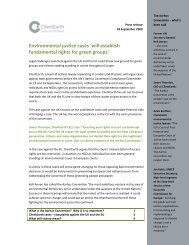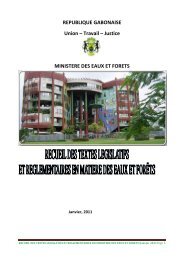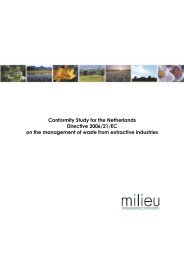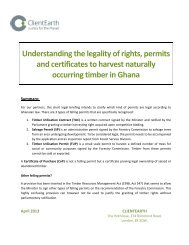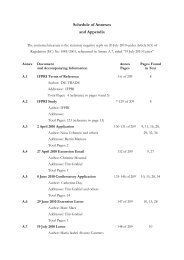50 | <strong>Environmental</strong> <strong>and</strong> <strong>social</strong> <strong>transparency</strong> <strong>under</strong> <strong>the</strong> Companies Act 2006Chapter 3: <strong>Environmental</strong> <strong>and</strong> <strong>social</strong> issues: Business issues | 51Reputation amongst State actors may also be extremely important for companiesin <strong>the</strong> mining <strong>and</strong> extractives industries. As well as <strong>the</strong>ir regulatoryroles, States may often be project partners for large mining <strong>and</strong> extractivesoperations, <strong>and</strong> so maintaining relationships of trust with <strong>the</strong>m can becentral to a company’s business prospects. These relationships must oftenbe maintained across several political regimes or administrations, whichcan present particular difficulties <strong>and</strong> complexities. Reputation is alsocentral to investor confidence <strong>and</strong> a range of o<strong>the</strong>r business relationships.Companies need to ensure <strong>and</strong> demonstrate strong <strong>and</strong> progressive managementof environmental <strong>and</strong> <strong>social</strong> issues to secure <strong>the</strong> confidence of<strong>the</strong>se key actors in <strong>the</strong>ir business.However, as we will see below in Chapter 4, shareholders <strong>and</strong> investorsshould be wary of superficial PR <strong>and</strong> issue avoidance, or any course ofaction which does not create a fundamental culture of corporate <strong>transparency</strong>,openness <strong>and</strong> accountability.3.1.2 Social licence to operate“Social licence is <strong>the</strong> acceptance <strong>and</strong> belief by society, <strong>and</strong> specificallyour local communities, in <strong>the</strong> value creation of [company]activities, such as [<strong>the</strong>y] are allowed to access <strong>and</strong> extract mineralresources…You don’t get your <strong>social</strong> licence by going to a government ministry<strong>and</strong> making an application or simply paying a fee. It is not a simplecase of throwing money at a problem <strong>and</strong> hoping that it goesaway.” 146– Pierre Lassonde, former President,Newmont Mining Corporation“In <strong>the</strong> extractive sectors, communities are <strong>the</strong> linchpins for accessto raw materials, without which companies’ operations wouldcease.” 147– Allen L. White, Co-fo<strong>under</strong> <strong>and</strong> former CEO,Global Reporting InitiativeSocial licence to operate is essentially <strong>the</strong> extent to which society acceptsor tolerates company activities. This is most relevant to company successin relation to individuals or groups in key positions who might complicateor obstruct company operations in <strong>the</strong> short, medium or long term. Sociallicence is particularly important to mining <strong>and</strong> extractives operations,which can be particularly highly affected by <strong>the</strong> willing consent of localpeople (as apart from any formal consent licence as granted by government).Such a licence has been broadly recognised as a critical success factorin mine development, 148 with companies such as Rio Tinto recognisingits vital importance to project development. 149 Respect for <strong>the</strong> needs <strong>and</strong>dem<strong>and</strong>s of local communities, <strong>and</strong> meaningful community participationin decision-making, are key.Factors involved for <strong>the</strong> mining <strong>and</strong> extractive industries in earninga <strong>social</strong> licence to operate with local communities include (but are notlimited to): level of meaningful community consultation <strong>and</strong> participationin decision-making that affects <strong>the</strong>m; level of local content employment,training <strong>and</strong> procurement; level of corporate <strong>transparency</strong> <strong>and</strong>communication with communities; avoidance of involvement with localindividuals or groups that may be divisive in local communities, includingmost importantly <strong>the</strong> avoidance of divisive relationships with militarisedgroups or aggressive security forces; efforts to build business partnershipswith communities; efforts to seek community support <strong>and</strong> capacity building;level of collaboration with communities to help meet <strong>the</strong>ir infrastructureneeds; <strong>and</strong> degree of <strong>under</strong>st<strong>and</strong>ing of local culture, language <strong>and</strong>history. 150Company reputation also interacts with <strong>social</strong> licence to operate. Companieswith poor reputations may be less readily trusted by local people,<strong>and</strong> thus gaining <strong>social</strong> licence may be more difficult <strong>and</strong> more expensivefor companies with a bad reputation, <strong>and</strong> <strong>the</strong> costs of its absence may begreater. Likewise poor relations with or treatment of people in specificcircumstances may have broad impacts on company reputation.The risk posed to a company’s <strong>social</strong> licence to operate by company activitiesthat negatively affect local communities <strong>and</strong> environment is almostself-evident. Operational disruption caused by a lack of <strong>social</strong> acceptancecan have very significant implications for a company’s business. This is aparticularly central concern for mining <strong>and</strong> extractives companies, whichcan be illustrated with reference to case study examples.Newmont in Peru: <strong>the</strong> opportunity loss of lacking <strong>social</strong>licence to operateIn 2004, Minera Yanacocha (a subsidiary of Newmont Mining Corp.) withdrewfrom its explorations at Cerro Quilish, following massive community
52 | <strong>Environmental</strong> <strong>and</strong> <strong>social</strong> <strong>transparency</strong> <strong>under</strong> <strong>the</strong> Companies Act 2006Chapter 3: <strong>Environmental</strong> <strong>and</strong> <strong>social</strong> issues: Business issues | 53protests. This, despite <strong>the</strong> fact that <strong>the</strong> company had expended substantialamounts of capital on exploration, <strong>and</strong> that <strong>the</strong> mine contained goldreserves reportedly worth an estimated $2 billion. 151Newmont stated, as published in a number of Peruvian newspapers, that ithad not always listened to <strong>the</strong> valid claims <strong>and</strong> concerns expressed by <strong>the</strong>Cajamarca community in <strong>the</strong> past, <strong>and</strong> that community opposition was apart of <strong>the</strong>ir decision to withdraw. 152 Minera Yanacocha’s operations manager,Guy Lansdown, was quoted as reflecting: “We thought we could goahead <strong>and</strong> explore Cerro Quilish… obviously <strong>the</strong> community did not thinkthat, so we pulled back. We’ve got to sharpen our pencils <strong>and</strong> get out <strong>and</strong>communicate with <strong>the</strong>m <strong>and</strong> work with <strong>the</strong>m.” 153In particularly extreme scenarios, <strong>the</strong> implications of failing to obtain ormaintain a <strong>social</strong> licence to operate may be volatile, extreme <strong>and</strong> disastrousfor companies.Shell in Nigeria: lacking a <strong>social</strong> licence?Shell has been exploring in Nigeria since <strong>the</strong> 1930s, <strong>and</strong> first successfullydrilled in <strong>the</strong> Niger Delta in 1956, 154 where it has been operating since.Many reports have suggested that its practices have faced opposition fromlocal communities in areas of operation. 155 It has been reported that Shellis perceived by Nigerian communities as having been ‘on side’ with corrupt<strong>and</strong> repressive military regimes 156 , <strong>and</strong> that many communities do not feelthat <strong>the</strong>y have benefitted from oil production, seeing only ill effects. 157Militant rebel groups, such as <strong>the</strong> Movement for <strong>the</strong> Emancipation of <strong>the</strong>Niger Delta, have proliferated in recent years <strong>and</strong> disrupted Shell operationsin increasingly severe ways, reportedly with <strong>the</strong> support of many membersof local communities: 158 insurrection, bombings, hostage-takings <strong>and</strong> o<strong>the</strong>rviolent attacks on oil facilities are now common occurrences in <strong>the</strong> Delta. 159In early 2006, violence in <strong>the</strong> Niger Delta forced Shell to shut down almosthalf of its Nigerian oil production. 160 In 2007, kidnappings <strong>and</strong> protests hadslashed production by nearly 1 million barrels per day. 161 A single facilityoccupation in 2007 caused cuts of 170,000 barrels per day. 162 In early 2008sources close to <strong>the</strong> situation were suggesting that Shell’s future in <strong>the</strong> areawas in severe doubt, 163 <strong>and</strong> in late 2008 large scale rebel attacks were stillcommonplace <strong>and</strong> causing severe damage to operations. 164To analyse <strong>the</strong> situation in terms of <strong>the</strong>ir ‘<strong>social</strong> licence to operate’, it couldbe argued that in <strong>the</strong> past oil companies in Nigeria have not focused enoughon gaining ‘<strong>social</strong> licence’ to operate by engaging with <strong>the</strong> Nigerian people’sneeds, focusing instead on <strong>the</strong> formal consent of <strong>the</strong> Nigerian state.As a result, <strong>the</strong>ir business is being affected in significant ways. In contrast,Newmont in Peru recognised that <strong>the</strong> potential for <strong>the</strong>ir operations wasbeing severely compromised by <strong>the</strong>ir lack of proper engagement with localcommunities – <strong>the</strong>y saw that <strong>the</strong>ir <strong>social</strong> licence to operate was weak, <strong>and</strong>recognised <strong>the</strong> business implications stemming from that.As resources become scarcer, companies will increasingly need to accessresources in environments with greater political <strong>and</strong> <strong>social</strong> complexity;<strong>the</strong> way that companies manage <strong>the</strong>ir <strong>social</strong> licence is only set to becomemore important to <strong>the</strong> business prospects of mining <strong>and</strong> extraction companies.If operations in an area are not realistic or likely to be profitable,as a result of such opposition <strong>and</strong> risk, shareholders should be aware of <strong>the</strong>factors involved so as to ensure that capital is not used to pursue flawedoperational strategies, only to see <strong>the</strong>m fall apart at a later stage.3.1.3 Regulatory freedomWhen companies engage in practices which are subject to controversy orwhich have significant local or international opposition, <strong>the</strong>y are exposing<strong>the</strong>mselves to <strong>the</strong> risk that a future change in law or o<strong>the</strong>r regulation willbe made by <strong>the</strong> host state government in <strong>the</strong> future which may significantlyincrease <strong>the</strong> costs for those operations <strong>and</strong> reduce <strong>the</strong> attractivenessof investment.Where company practices are having impacts on local communities orenvironments, <strong>and</strong> are facing opposition as a result, <strong>the</strong>y are running <strong>the</strong>risk of inducing such regulatory shifts, <strong>and</strong> it is in shareholders’ intereststo have access to all relevant information, so as to be aware of <strong>the</strong> ways inwhich <strong>the</strong>ir investment may be being put at risk by company practices.Fuel extraction from <strong>the</strong> Canadian tar s<strong>and</strong>s: regulatory risk<strong>and</strong> str<strong>and</strong>ed assets‘Tar s<strong>and</strong>s’ (also commonly known as ‘oil s<strong>and</strong>s’) are bituminous s<strong>and</strong>s;deposits of an extremely dense <strong>and</strong> viscous form of petroleum called bitumen.They are found in large quantities in a number of places worldwide,including Alberta, Canada. They are very expensive both to extract <strong>and</strong>upgrade into usable products. 165 However, rocketing global oil prices made<strong>the</strong> tar s<strong>and</strong>s an economically viable option, <strong>and</strong> major extraction companiespiled in with capital investment. 166


